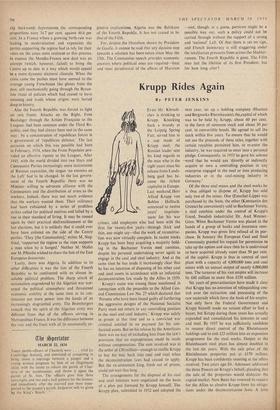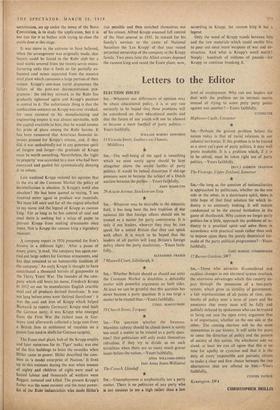Krupp Rides Again
By PETER JENKINS EVEN Mr. Khrush- chev is drinking to Krupp. Knocking back a brandy at the Leipzig Spring Fair, served him in a cup made of Krupp steel, the Russian leader sent his kind regards to the man who in the eight years since his release from Lands- berg gaol has be- come the richest capitalist in Europe. Last weekend, Herr Alfred Krupp von Bohlen - Halbach, sentenced to twelve years' imprison- ment for his war crimes, told employees who had been with the firm for twenty-five years—through thick and thin, one might say—that the work of reconstruc- tion was now virtually complete. In recent weeks Krupp has been busy acquiring a majority hold- ing in the Bochumer Verein steel combine, despite his personal undertaking never again to engage in the coal and steel industry. And at the same time he has made it increasingly clear that he has no intention of disposing of his other coal and steel assets in accordance with an industrial deconcentration law made by the Allies in 1950.
Krupp's name was among those mentioned in connection with the preamble to the Allied Con- trol Commission Law No. 27 which declared that 'Persons who have been found guilty of furthering the aggressive designs of the National Socialist Party must not return to any controlling position in the steel and coal industry.' Krupp was safely in prison at this time and as a convicted war criminal entitled to no payment for his con- fiscated assets. But on his release by the Americans there was no way of excluding him from the lavv's provision that no expropriation could be made without compensation. The sum involved was in the order of £30 million—enough to enable Krupp to buy his way back into coal and steel when the deconcentration laws had ceased to apply. But the ex-armament king, fresh out of prison, could not wait that long.
The arrangements for the disposal of his coal and steel interests were negotiated on the basis of a .plan put forward by Krupp himself. The Krupp plan, submitted in 1952 and adopted the next year, set up a holding company (Huetten und Bergwerke Rheinhausen), the.capital of which was to be held by Krupp, about 60 per cent. in the form of common stock and about 30 per cent, in convertible bonds. He agreed to sell the stock within five years. To ensure that he would not use the proceeds of these sales, together with certain royalties permitted him, to re-enter the industry, he was required to enter into a personal pledge. Consequently, in 1953 he gave his solemn word that he would not 'directly or indirectly acquire or own a controlling position in any enterprise engaged in the steel or iron producing industries or in the coal-mining industry in Germany.'
Of the three coal mines and the steel works he is thus obliged to dispose of, Krupp has sold only two of the mines. One (Emscher-Lippe) was purchased by the State, the other (Konstantin der Grosse) he conveniently sold to Bochumer Verein, a steel combine under the control of Krupp's friend, Swedish industrialist Dr. Axel Wenner- Gren. When Bochumer Verein was placed in the hands of a group of banks and insurance com- panies, Krupp was given first refusal of its pur- chase. In January the European Coal and Steel Community granted his request for permission to take up the option and since then he is understood to have acquired already more than 50 per cent. of the capital. Krupp is thus in control of steel plant with a capacity of 4,000,000 tons and coal mines with an annual output of nearly 6,000,000 tons. The turnover of his vast empire will increase by £60 million to more than £350 million.
Six years of procrastination have made it clear that Krupp has no intention of relinquishing con- trol over the extraction and processing of the raw materials which form the basis of his empire. Not only have the Federal Government and Krupp himself made no serious effort to find a buyer, but Krupp during these years has actually expanded and consolidated his interests in coal and steel. By 1957 he was sufficiently confident to resume direct control of the Rheinhausen holdings and to sink £25 million into an expansion programme for the steel works. Output at the Rheinhausen steel plant has almost doubled in the last six years. With the sale price of the Rheinhausen properties put at £170 million, Krupp has been confidently sneering at the offers received. Two years ago Dr. Adenauer addressed the three Powers on Krupp's behalf, pleading that the sale of the properties would dislocate the capital market. Now Bonn has renewed its request for the Allies to absolve Krupp from his obliga- tions under the deconcentration laws. A joint
commission, set up under the terms of the Bonn Convention, is to study the application, but it is too late for it to bother with trying to close the stable door at this stage.
It was naive in the extreme to have believed, when the arrangement was originally made, that buyers could be found in the Ruhr club 'for a steel works severed from the twenty-seven manu- facturing units that it feeds or for partially ex- hausted coal mines separated from the massive steel plant which consumes a large portion of their output. Krupp's one-man cartel dramatises the failure of the post-war decoucentration pro- gramme: the old-boy network in the Ruhr has gradually tightened again and Krupp's position . is central to it. The unfortunate thing is that the confiscation sentence on Krupp was'ever revoked, for once restored to his manufacturing and engineering empire it was almost inevitable, with the capital available to him, that he would resume his pride of place among the Ruhr barons. It has been rumoured that American financial in- terests pressed for Krupp's release, and, if they did, it was undoubtedly not in any generous spirit of forgive and forget—the gratitude of Krupp must be worth something. Nevertheless, the 'right to property' was accorded to a man who had been convicted and gaoled for systematically denying it to others.
Last weekend Krupp restated his opinion that in the era of the Common Market the policy of decartelisation is obsolete. Is Krupp's word also obsolete? He ha S been quoted as saying, 'I am resolved never again to produce war materials. We must kill once and for all the stigma attached to my name and the legend of Krupp as cannon king.' For as' long as he has control of coal and steel there is nothing but a scrap of paper to Prevent Krupp from making armaments once more. Nor is Krupp the cannon king a legendary mOnster.
A, company report in 1936 presented the firm's history in a different light : 'After a pause of many, years,' it read, 'the company has again car- ried out large orders for German armaments, and has thus returned to an honourable tradition Of the company.' An early Krupp is thought to have contributed a thousand barrels of gunpowder to the Thirty Years' War. The founder of the com- pany which still bears his name, Friedrich Krupp in 1812 set out `to manufacture English crucible steel and all products derived therefrom.' It was not long before arms were derived therefrom': it was the coal and iron of Krupp which helped Bismarck to reunite Germany; Krupp steel built the German navy; it was Krupp who emerged from the First War the richest man in Ger- many (and afterwards collected a large sum from a British firm in settlement of royalties on a patent fuse used in shells for German targets).
The Essen. steel plant, hub of the Krupp empire and later notorious for its `Tiger' tanks, was one of the first buildings to hoist the swastika when Hitler came to power. Hitler described the com- bine as 'a model enterprise of Nazism.' It lived up to this estimate during the war when women of eighty and children of eipti•were' used as forced labour and thousands of workers were flogged, tortured and killed. The present Krupp's father was the most eminent and the most power- of the Ruhr industrialists who made Hiller's rise possible and then enriched themselves out of his crimes. Alfred Krupp assumed full control of the Nazi arsenal in 1943. In reward for his family's services to the cause of National Socialism the 'Lex Krupp' of that year vested perpetnal ownership of the company in the Krupp family. Two years later the Allied armies deposed the cannon king and razed the Essen plant; now, according to Krupp. the cannon king is but a legend.
Only the word of Krupp stands between him and the raw materials which could enable him to pour out once more weapons of war and de- struction. And what is Krupp's word worth? Simply : hundreds of millions of pounds—for Krupp to continue breaking it.



































 Previous page
Previous page